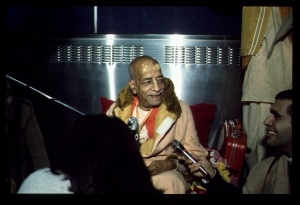SB 10.56.37: Difference between revisions
(Vanibot #0018 edit: make synonym terms in Sanskrit italic in SB - Vanisource) |
(Vanibot #0054 edit - transform synonyms into clickable links, which search similar occurrences) |
||
| Line 23: | Line 23: | ||
<div class="synonyms"> | <div class="synonyms"> | ||
''upalabhya'' | ''[//vanipedia.org/wiki/Special:VaniSearch?s=upalabhya&tab=syno_o&ds=1 upalabhya]'' — recognizing; ''[//vanipedia.org/wiki/Special:VaniSearch?s=hṛṣīkeśam&tab=syno_o&ds=1 hṛṣīkeśam]'' — the Lord of the senses; ''[//vanipedia.org/wiki/Special:VaniSearch?s=mṛtam&tab=syno_o&ds=1 mṛtam]'' — someone dead; ''[//vanipedia.org/wiki/Special:VaniSearch?s=punaḥ&tab=syno_o&ds=1 punaḥ]'' — again; ''[//vanipedia.org/wiki/Special:VaniSearch?s=iva&tab=syno_o&ds=1 iva]'' — as if; ''[//vanipedia.org/wiki/Special:VaniSearch?s=āgatam&tab=syno_o&ds=1 āgatam]'' — come; ''[//vanipedia.org/wiki/Special:VaniSearch?s=saha&tab=syno_o&ds=1 saha]'' — with; ''[//vanipedia.org/wiki/Special:VaniSearch?s=patnyā&tab=syno_o&ds=1 patnyā]'' — a wife; ''[//vanipedia.org/wiki/Special:VaniSearch?s=maṇi&tab=syno_o&ds=1 maṇi]'' — the jewel; ''[//vanipedia.org/wiki/Special:VaniSearch?s=grīvam&tab=syno_o&ds=1 grīvam]'' — on His neck; ''[//vanipedia.org/wiki/Special:VaniSearch?s=sarve&tab=syno_o&ds=1 sarve]'' — all of them; ''[//vanipedia.org/wiki/Special:VaniSearch?s=jāta&tab=syno_o&ds=1 jāta]'' — aroused; ''[//vanipedia.org/wiki/Special:VaniSearch?s=mahā&tab=syno_o&ds=1 mahā]'' — great; ''[//vanipedia.org/wiki/Special:VaniSearch?s=utsavāḥ&tab=syno_o&ds=1 utsavāḥ]'' — rejoicing. | ||
</div> | </div> | ||
Latest revision as of 19:29, 17 February 2024

A.C. Bhaktivedanta Swami Prabhupada
Please note: The synonyms, translation and purport of this verse were composed by disciples of Śrīla Prabhupāda
TEXT 37
- upalabhya hṛṣīkeśaṁ
- mṛtaṁ punar ivāgatam
- saha patnyā maṇi-grīvaṁ
- sarve jāta-mahotsavāḥ
SYNONYMS
upalabhya — recognizing; hṛṣīkeśam — the Lord of the senses; mṛtam — someone dead; punaḥ — again; iva — as if; āgatam — come; saha — with; patnyā — a wife; maṇi — the jewel; grīvam — on His neck; sarve — all of them; jāta — aroused; mahā — great; utsavāḥ — rejoicing.
Translation and purport composed by disciples of Śrīla Prabhupāda
TRANSLATION
Seeing Lord Hṛṣīkeśa return as if from death, accompanied by His new wife and wearing the Syamantaka jewel on His neck, all the people were roused to jubilation.
PURPORT
According to Śrīla Viśvanātha Cakravartī, Jāmbavān had placed the jewel on the Lord's neck when he had presented his daughter in marriage.